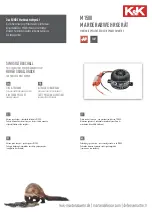
CTI 2572-A Installation and Operation Guide V1.3
11
TCP Protocol
The TCP protocol requires that a logical connection be established between two points before
messages can be sent. This method, called
connection-oriented services
, provides delivery
acknowledgement and message flow control within the TCP/IP protocol. If a message is not delivered
correctly, the TCP protocol will cause the message to be re-transmitted.
TCP is generally slower than UDP because additional acknowledgement messages must be
transmitted and evaluated. However, there are several instances in which it should be used:
1.
If you have a network whose quality requires a significant amount of message re-transmission,
TCP can provide better overall performance because the TCP is quicker at delivery
acknowledgement and retry than the application level, which typically relies on a message
timeout measured in seconds.
2.
If you are using the Internet to access the module, you may want to consider TCP. When
traversing the Internet, some gateways may break a packet up into smaller chunks, a process
called fragmentation. The smaller packets may be sent via different paths and could arrive out of
order. TCP will ensure that the fragmented packets will be re-assembled in the correct order,
while UDP will not.
Maximizing Performance
For best performance, you should place the module in a local rack (the one containing the PLC).
Using a Special Function module such as the 2572-A in a Remote I/O rack imposes significant
additional communications overhead and noticeably increases the scan time of the PLC. This effect is
especially noticeable when transferring large amounts of data.
NOTE:
The 2572-A will not work in a remote rack using the Profibus Remote Base Controller (RBC). Profibus
does not support Special Function modules.
The module is allowed to access to the PLC only once during a scan. Ensure that the task codes per
scan setting of the PLC is set to eight (8). This allows the maximum number of PLC access requests
to be processed in a single scan. Set the PLC to the shortest acceptable scan time or use the variable
scan time setting.
Heavily congested networks can degrade module performance. When the network traffic is heavy,
the use of an Ethernet switch can reduce loading on an individual segment. If broadcast traffic is
excessive, you will have to use a router or a layer 3 switch to block broadcasts.
Security Considerations
Since the 2572-A module communicates on a TCP/IP network, you should take precautions to
prevent someone from inadvertently or maliciously interrupting the operation of the module. Some
actions you can take include:
Use a dedicated network that does not connect to other networks
. By eliminating external
physical connections, you limit access to only those on the network segment.
Use a router with firewall capability to connect to other networks
. If isolating the network from
other networks is not practical, you can use “firewall” techniques to limit access from the outside.
Summary of Contents for 2572-A
Page 8: ......
Page 16: ......
Page 28: ......
Page 32: ......
Page 60: ......
Page 84: ......
Page 96: ......
Page 104: ...CTI 2572 A Installation and Operation Guide 96 WX WY Quick Reference...
Page 112: ......
Page 116: ......
Page 126: ......
Page 130: ...CTI 2572 A Installation and Operation Guide 122 WX WY Quick Reference...
















































